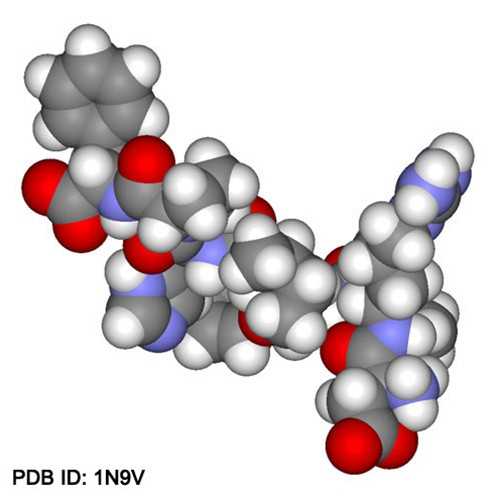Anti-Angiotensin II Universal Antibody
This polyclonal antibody was generated against a synthetic peptide corresponding to bovine Angiotensin II and recognizes all species of Angiotensin II. This antibody can also be used universal detection of apoptosis.
Angiotensin II has been shown to inhibit cell proliferation and differentiation and to promote apoptosis in several cell types and tissues. Protease activation during apoptosis has been shown to lead to the production of excess Angiotensin II, which is conserved in its sequence between species, and can easily be detected by ELISA.
Angiotensin (Ang, AGT, ANHU, SERPINA8) is a peptide hormone causing vasoconstriction and a subsequent increase in blood pressure. It is an essential component of the renin-angiotensin system (RAS), a potent regulator of blood pressure, body fluid and electrolyte homeostasis. In response to lowered blood pressure, the enzyme renin cleaves angiotensinogen to produce angiotensin I, a substrate of angiotensin converting enzyme (ACE), which produces the physiologically active peptide angiotensin II. Defects in angiotension can lead to essential hypertension and the autosomal recessive disorder, renal tubular dysgenesis (RTD).
From the laboratory of Alexander M. Zagariya, PhD, University of Illinois at Chicago.
 Part of The Investigator's Annexe program.
Part of The Investigator's Annexe program.
This polyclonal antibody was generated against a synthetic peptide corresponding to bovine Angiotensin II and recognizes all species of Angiotensin II. This antibody can also be used universal detection of apoptosis.
Angiotensin II has been shown to inhibit cell proliferation and differentiation and to promote apoptosis in several cell types and tissues. Protease activation during apoptosis has been shown to lead to the production of excess Angiotensin II, which is conserved in its sequence between species, and can easily be detected by ELISA.
Angiotensin (Ang, AGT, ANHU, SERPINA8) is a peptide hormone causing vasoconstriction and a subsequent increase in blood pressure. It is an essential component of the renin-angiotensin system (RAS), a potent regulator of blood pressure, body fluid and electrolyte homeostasis. In response to lowered blood pressure, the enzyme renin cleaves angiotensinogen to produce angiotensin I, a substrate of angiotensin converting enzyme (ACE), which produces the physiologically active peptide angiotensin II. Defects in angiotension can lead to essential hypertension and the autosomal recessive disorder, renal tubular dysgenesis (RTD).
From the laboratory of Alexander M. Zagariya, PhD, University of Illinois at Chicago.
 Part of The Investigator's Annexe program.
Part of The Investigator's Annexe program.
| Product Type: | Antibody |
| Antigen: | Bovine Angiotensin II |
| Accession ID: | P01017 |
| Molecular Weight: | 1.03217 kDa |
| Isotype: | Antiserum |
| Clonality: | Polyclonal |
| Reactivity: | Universal, all species |
| Immunogen: | KLH conjugated peptide corresponding to Bovine Ang II |
| Species Immunized: | Rabbit, 6 months old |
| Epitope: | DRVYVHPF |
| Buffer: | Serum |
| Tested Applications: | ELISA |
| Storage: | -20C |
| Shipped: | Cold Packs (Domestic, Overnight); Dry Ice (International) |
Measurement of apoptosis via Human Angiotensin II Antibody and ELISA

ELISA experiments were perfomed using the Anti-Angiotensin II Universal Antibody. Cells were either treated with apoptosis inducer 4-hydroxenoneal (4-HNE) or left untreated.
Adapted from: Zagariya AM. Exp Cell Res. 2012 Apr 15;318(7):861-6.
- Zagariya AM. A novel method for detection of apoptosis. Exp Cell Res. 2012 Apr 15;318(7):861-6.
If you publish research with this product, please let us know so we can cite your paper.


